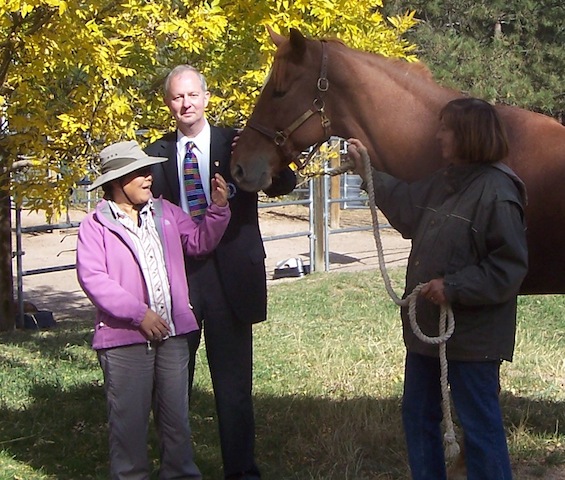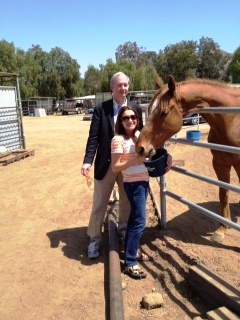Here are some cool Q&A that will hopefully answer some of your questions. Mr. John Murrell is fighting for the right cause! Thank you Mr. Murrell for standing up for horses! ~Declan
Q&A: John Murrell campaigns against slaughter
Texas oilman and racehorse owner John R. Murrell is busier than a one-armed paperhanger these days. But it isn’t spreadsheets keeping him up to all hours, making calls, and writing impassioned letters.
Those in the horse world know Murrell as an increasingly active voice for horse welfare. He is often a lifeline to horse-rescue nonprofits who need cash to buy horses from auctions that sell to meat buyers, and he has recently been making news with a letter-writing campaign to try to stop the return of horse-slaughter plants to American soil.
Murrell recently wrote to Oklahoma Gov. Mary Fallin, to argue three key points against a “Yes” vote for slaughter. His points: slaughter is inhumane; horsemeat is unsafe for human consumption; and, slaughterhouses themselves carry a stench that invades a community, emits blood that leeches into neighborhood septic systems, and dissuades businesses from developing nearby. (Please read John Murrell’s letter in the Thoroughbred Daily News).
Although the governor voted in favor of opening a slaughterhouse anyway, Murrell is not giving up hope. The Dallas horseman has deep roots and an even deeper love for horses. His Thoroughbred John’s Treasure placed third in the 1986 Belmont Stakes, beating Ferdinand, and this battle against slaughter is something he feels he owes to all the hardworking horses out there.
In this week’s Clubhouse Q&A, Murrell discusses the shifting landscape of the horse-slaughter issue in America.
Q: John, you’re a successful horseman and businessman. What motivates you to continue the fight against slaughter and slaughter in the USA?
Cruelty, abuse, and stupid, avaricious people.
Q: Why are plans to return horse-slaughter plants to American soil being considered?
Anything like this always comes back to money. In addition, when the Obama Administration put the language back in re-funding US inspectors at horse-slaughter plants those who were involved in that industry thought that was their opportunity to open slaughterhouses on American soil again.
The horse-slaughter plants are typically foreign owned. And while the pro-slaughter people will argue that they create jobs, they are, in fact, very low-paying jobs, and there are not many of them. When slaughter plants were operating in the US, there were only about 178 people working in any one plant.
Q: You mentioned in a letter to Oklahoma Gov. Mary Fallin that slaughterhouses have a negative environmental impact on the community. Please explain this.
We had a slaughterhouse in Kaufman Texas, which was called Dallas Crown, and was a Belgium-owned company.
The environmental impact and business impact it had on the community been devastating. Because horses bleed a lot when they’re slaughtered, blood was leeching into the plumbing systems of neighboring homes, and backing up into their bathtubs and toilets.
And from an economic standpoint, the town couldn’t attract any businesses to locate near the slaughterhouse.
Q: Why is it important for horsemen such as yourself to go on the record to oppose horse slaughter?
To continue reading this article, <CLICK HERE>.


No comments:
Post a Comment